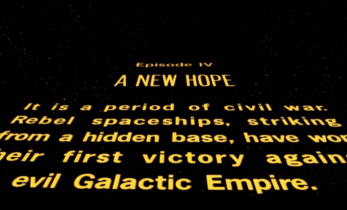Greater than 2 minutes, my friend!
Are we serious about our profession? If we aren't, nobody else will be...
So, I’m chatting with a group of friends and they are asking how things are going in the translation business and suddenly, lo and behold, a friend in the group says: “Oh, my son is translating”. I know her son has recently graduated from high school and from a school in which the English language is not exactly a forte. And she continues: “Rachel –a translator I know and who is a top-notch translator in my book– has been giving him documents to translate and paying him for his work”. I smile pleasantly and congratulate her on her son’s work opportunity… and quickly change the subject.
The issue, of course, is eating me up inside. Do people actually think that anyone who has basic knowledge of a second language can do the job of a professional translator? And worse of all, is this what the professional translator providing the jobs to this teenager believes? Mind you, I’m not against youths learning our trade and working at it (translation, of course, is an art slowly mastered through experienced) but the message conveyed through my friend’s comment was that translation is something that can be performed by practically anyone as long as they had an inkling of a second language. I admit that I felt betrayed by the translator and, at the same time, I gained a better understanding of how the translation industry is able to spark bidding wars among “translators” and undervalue the art performed by professionals.
No wonder machine translation is increasing! It’s probably as good –if not better– than translations received from “translators” like my friend’s son… and if it is we studied and experienced professionals who are furthering this view on our trade, then we are no doubt going to become an extinct species, as many are predicting.
Throughout almost 2 decades of professional experience as a graduated translator it has become clear to me that VERY few people, besides translators, have even the slightest clue about what translation is, what it involves and its contribution to our world throughout history.
Many have learned the hard way, like a potential client of mine who, after considering my rate too high, turned to another translator (now I’m wondering if it might have been someone like my friend’s son) and called me back three weeks later to say, “I should have gone with you”, in stupor and filled with anguish. It turns out that his “minor offense” of driving in a 40mph zone at 60mph had been translated as abuse of a minor! He noticed the anger in the eyes of all those watching him as he entered the Department of Immigration to process his papers requesting permission to reside in the country. In this case, paying double for the translation was the least of his worries. The cost and time involved in cleaning his record and clearing his name became an on-going and lengthy nightmare he couldn’t seem to wake up from.
Nonetheless, there are many others who continue to view Translation as a DIY project-like activity. The questions, my peers, are the following: What needs to be done to change this reality? And who, where, when and how should it be done? The Why, in my opinion, is quite obvious: Because if we who know what it takes to transfer meaning in order to ensure communication among people across the world don’t do anything about it, no one else will; and the only way to avoid others from undervaluing our work and underestimating our craft is to join forces to educate others on Translation and value the art we perform. All ideas are welcome!





Marta, thanks for this awesome post! Translators should speak for themselves as no one else can do that better than us. We shall educate our clients and people around us bringing up the idea that translation is a complex, creative, intellectual activity that requires extraordinary skills and exceptional knowledge in multiple areas or expertise. The fact that machines make intercultural communication easier does not mean that they (machines) can force us out of the industry – all fallible business platforms exploiting crowd + machine translation platforms on the web will not survive the decade, I bet. Future of the translation is in combination and synthesis of human and computer-assisted translation, we cannot deny that. But human translators (maybe together with programmers) will remain to be the leading force of our industry and profession. I guess you remember the times when programming was treated by the society as a trifling game (or a mysterious craft), but not as a serious profession. However, now it is one of the most reputable and well-paid professions. I think that all intellectual activities in combination with modern technologies will evolve into something new and thanks to mutual efforts of our colleagues, people around the globe will finally understand the true value of a translator’s work.
“I think that all intellectual activities in combination with modern technologies will evolve into something new and thanks to mutual efforts of our colleagues, people around the globe will finally understand the true value of a translator’s work.”
Yes, Simon! I’m hoping that sooner or later technologies will be created to move our profession forward and not for the sake of stealing money from poor translators (which is why translators are so wary of new technologies and platforms).
I think this can only be changed if new technologies are being developed in collaboration with translators with constant feedback loop (kinda like I’m doing with The Open Mic) 😉
Thanks for raising this topic, Marta and congrats on publishing your first Open Mic story! I think it is important to talk about those problems consistently. Blogging and writing is a great way to get your message across too.
It’s great that you’ve given a real-life example of translation gone wrong. I think if we really want to “educate” our clients or influence their opinion we need to give them more real examples of all the things that can go wrong. It seems like its a great way to warn them about the possible repercussions.
We also need to put a stronger focus on the quality and the customer service. If we want our clients to believe that professional translators worth their money, we need to show them how we can help them reach their goals and make more money.
Thank you for your comments and kind words, Simon and Dmitry! You have both given me much to think about.
I love the comment on the importance of quality and customer service and agree that we must pay close attention to and improve in this aspect. I also agree with technology being developed in collaboration with translators! A wonderful idea!!!
The thing is that it seems that we need more time to be able to do all this and time is something that few of us have, given the time it takes to do our work professionally. It would be wonderful to be able to take the reigns and move things forward in the direction that we, translators, know –from experience– things should go but, how do we do it?
Sharing our ideas on the Open Mic seems like a great starting point! Thanks for the space provided, Dmitry! I believe you’re doing more than you know with Open Mic!
OMG and LOL: “‘minor offense’ of driving in a 40mph zone at 60mph had been translated as abuse of a minor! ”
Is that true? That is so funny! I think you could make coffee mugs and wall plaques with that quote and sell them to translators as inspiration to keep going.
These are the “details” many translation buyers don’t understand when it comes to a properly executed translation. Some learn from others’ experiences, and some have to go through it themselves.
it sounds like something made up for such purpose, E.S. However it is, unfortunately true!
The anguish in the man’s voice when he hold me about it, still rings in my ears,.. I felt so bad for him! Can you imagine being in a foreign country, with no clue about the language and having this happen to you? For me it was a lesson on our responisibilty as translators and the diservice we can do if we do not take our job seriously. Choosing a translator based on the best price offered (and not on experience and studies) is what this leads to. Again, we need to educate others on the importance of translation and professional translatiors.
Marta, I feel like I already know you as you’ve commented on some of my blog posts. Congrats on sharing your first story on The Open Mic. You did a fantastic job! This is a topic that fascinates me.
Becoming a Freelance Translator is not an easy task. I believe we first have to be realistic about our own writing abilities and decide if this is something we can be above-average at. The variety among translators is quite diverse–There are many translators with high qualifications and experience or no qualifications and no experience at all, some charge very little and are extremely good, while others charge a lot and are really bad. Many with certifications are average as far as translation skills goes, while others with no certifications excel and have established their brand effectively.
I guess my point is that regardless of our qualifications, we first need to know ourselves and what it takes to succeed in a field of such diversity and flexibility. The reality is that a degree in Translation is not a must to be able to translate–but the ability to write well is. If we have good writing skills and know how to market ourselves well, we’ll succeed. It does take a lot of work and consistency, but it’s doable.
As freelancers we are always going to have to deal with people who are not equipped with the necessary writing skills to execute professional translations and that’ll charge very little. Heck, there are many who execute professional work and still charge very little! It is a reality that won’t go away. But we can still keep our cool and not succumb to the temptation of lowering our rates. I actually wrote a blog post about it. =-) Thank you, Marta, for allowing me to share my thoughts about this topic and comment on your post!
Thank you for commenting and sharing your thoughts on my post, Beverly! It is a pleasure to connect with translators here on the Open Mic. I welcome the opportunity to share with and learn from all of you.
I totally agree with you on the importance of good writing skills to excel as a translator; reading is also key, in order to polish these skills.
Keep in touch!